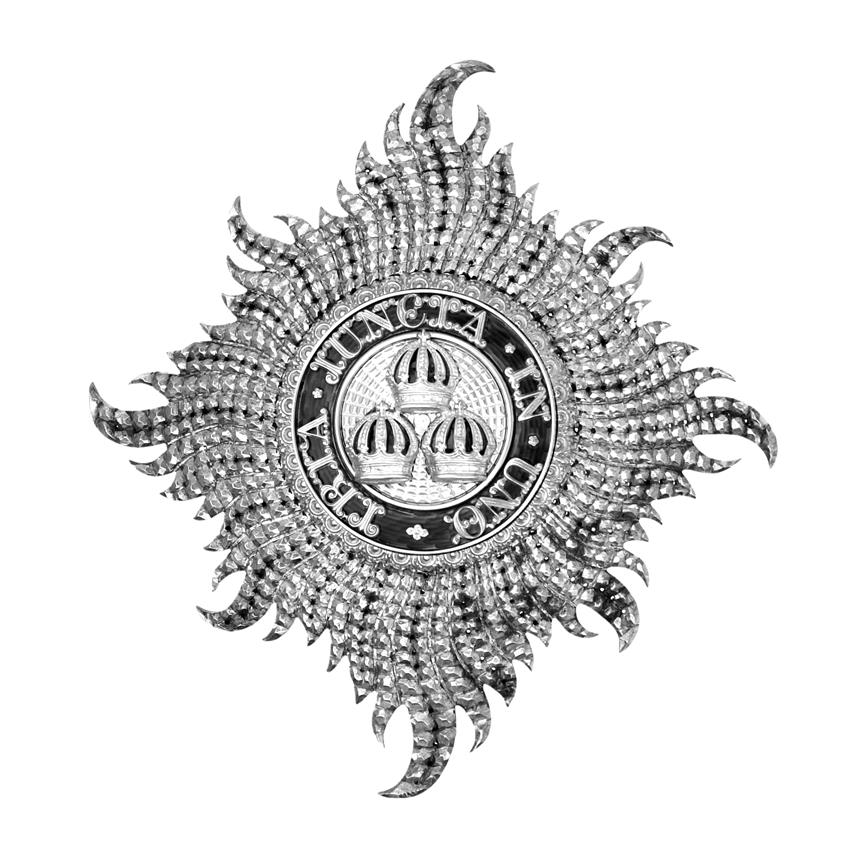won the day. Only Pitt denounced the treaty, seeing in its terms the seeds of a future war.
For the next ten years George Augustus remained quietly in England with his famous “Eliott Horse.” The regiment was popular with King George III, who was so pleased with its intrepid behavior in Germany and its admirable conduct at home that he bestowed on it the title of “The King’s Royal Regiment of Hussars.” But Pitt had been right in judging the terms of the peace with France a disaster. When, in 1775, the American colonies were provoked into rebellion by the imprudent stubbornness of George III and his ministers, Britain found herself again threatened by the powerful fleets of France and Spain. For George Augustus, at the age of 61, the most difficult and demanding stage of his career had begun.
An attack on Gibraltar, the great British bastion which commanded the gateway between the Mediterranean and the Atlantic, could be expected as soon as Britain was seen to be fully committed in America. Measures were taken to put ‘the Rock’ in a state of readiness and George Augustus, who had a special knowledge of fortifications and whose resolution and experience were widely acknowledged, was appointed Governor. He arrived on 2 June 1778. Within months the Spanish had sealed the land frontier and in June 1779 a French fleet completed the blockade by cutting off Gibraltar from the sea. The great siege had begun. For three years, seven months, and twelve days, George Augustus and his heroic garrison held the fortress against the combined forces of the French and Spanish fleets. They repulsed every attempt to gain a foothold on the Rock and withstood every effort by the enemy to starve them into submission. By the end of the siege the Rock of Gibraltar had become a monument to British courage and tenacity, and the name of Eliott was to be heard on the lips of every soldier in Europe.
When peace was made in 1783 and the siege ended, the soldiers and sailors of the Gibraltar garrison were treated with the greatest of honor. They received the thanks of both Houses of Parliament and 4,000 pounds of prize money was distributed among the defenders. As a further mark of favor, the King bestowed on their General the Most Honorable Order of the Bath. This new decoration was ceremoniously conferred on
George Augustus by the King’s representative, Lieutenant General Boyd, at a full-dress parade on the Rock.
George Augustus remained in Gibraltar as Governor until June 1789, when he returned to England. New honors awaited him on reaching home. He was raised to the peerage and voted a pension of 2,000 pounds a year by Parliament. But to George Augustus himself the greatest honor paid to him was the emblazoning of his arms on the colors of the three Hanoverian regiments that had taken part in the siege. These regiments made their motto: “Mitt Eliott Ruhm und Sieg,” – “With Eliott Fame and Victory.”
The siege, however, had taken its toll. Only a year after his return to England the General was smitten with a stroke and his health began to give way. Desiring to end his days on the Rock that had made him famous and that he had come to love, the intrepid old soldier petitioned the King for a restoration of his command. The petition was granted, but George Augustus did not live to see the Rock again. On 6 July 1790, Eliott died at the Schloss Kalkofen, Aachen, of palsy / stroke, allegedly brought on by drinking too much of the local mineral water, and was initially buried in the grounds of the Schloss. His personal estate was probated by 27 July and his furniture sold off by his heirs. In 1790, his body was disinterred and reburied at Heathfield, East Sussex. Later still, his body was again disinterred and reburied at St Andrew’s Church, Buckland Monachorum, Devon in the church associated with his wife’s Drake ancestry
